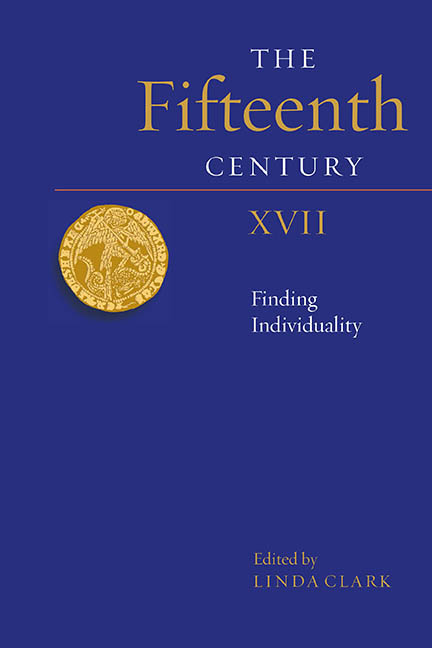Book contents
- Frontmatter
- Contents
- Contributors
- Preface
- Abbreviations
- Royal Wills, 1376–1475
- Propaganda, Piety and Politics in the Fifteenth Century: Henry V’s Vernacular War Letters to the City of London, 1417–21
- ‘To Be of Oon Demeanyng and Unite for the Wele of Your Self and of the Contre There’: Yorkist Plans for the Lordship of Ireland, the Last Phase
- A Mirror for a Princess: Antoine de la Sale and the Political Psyche of Margaret of Anjou
- Margaret of Anjou and the Language of Praise and Censure
- On ‘Peyne of their Lyfes … they Shuld no Verdit gif, but if they Wold Endite the Seid William Tresham of his Owen Deth’: the Murder of Lawyers in Fifteenth-Century England
- ‘Stond Horeson and Yelde thy Knyff’: Urban Politics, Language and Litigation in Late Medieval Canterbury
- ‘In to the Sterre Chambre’: Female Plaintiffs Before the King’s Council in the Reign of Henry VII
- Index
- Contents of Previous Volumes
Royal Wills, 1376–1475
Published online by Cambridge University Press: 19 August 2020
- Frontmatter
- Contents
- Contributors
- Preface
- Abbreviations
- Royal Wills, 1376–1475
- Propaganda, Piety and Politics in the Fifteenth Century: Henry V’s Vernacular War Letters to the City of London, 1417–21
- ‘To Be of Oon Demeanyng and Unite for the Wele of Your Self and of the Contre There’: Yorkist Plans for the Lordship of Ireland, the Last Phase
- A Mirror for a Princess: Antoine de la Sale and the Political Psyche of Margaret of Anjou
- Margaret of Anjou and the Language of Praise and Censure
- On ‘Peyne of their Lyfes … they Shuld no Verdit gif, but if they Wold Endite the Seid William Tresham of his Owen Deth’: the Murder of Lawyers in Fifteenth-Century England
- ‘Stond Horeson and Yelde thy Knyff’: Urban Politics, Language and Litigation in Late Medieval Canterbury
- ‘In to the Sterre Chambre’: Female Plaintiffs Before the King’s Council in the Reign of Henry VII
- Index
- Contents of Previous Volumes
Summary
Before the late fourteenth century, the history of the English royal will (or testament) is patchy. The first that is known to survive is that of King Alfred, in the 880s, followed by that of his grandson, Eadred, around 955. After that there is a gap of over two hundred years. Although chroniclers report the deathbed wishes of kings such as William the Conqueror and Henry I, the first post-Conquest king the text of whose will survives is Henry II, drawn up in 1182. Those of King John, Henry III and Edward I also survive, although Henry III's was made as early as 1253 and probably superseded, while Edward I's was dated 1272, before he became king, and certainly superseded; in neither case, however, has a later will survived. The only one of these which is the original document is that of John, in the archives of Worcester cathedral, where he was buried. Edward II apparently died intestate, so that after 1272 there is a further gap of over a century before the next surviving royal will, that of Edward III.
The focus of these twelfth-and thirteenth-century royal wills (as of other contemporary wills) was religious, charitable and familial. Some included cash bequests of hundreds or thousands of marks to religious orders or named religious houses; all specified that money should be made available for the defence of the Holy Land and that alms be distributed to the poor and needy;3 King John and Henry III specified their place of burial (Worcester and Westminster respectively); provision might also be made for the queen, and for the king's children until they came of age; Henry III bequeathed two precious crucifixes and two sets of vestments for his chapel, one to Westminster Abbey, the other to his eldest son; he also asked that his debts be paid, while Edward I deputed his executors to hear his outstanding accounts, probably with the same object in view. In every case, much was left to the discretion of the king's executors, in whom great trust was placed.
The fact that the Church was almost invariably the main beneficiary meant that the making of wills was strongly encouraged by churchmen. By around 1200, it was also generally accepted that it was in church courts that probate was granted and testamentary disputes heard.
- Type
- Chapter
- Information
- The Fifteenth Century XVIIFinding Individuality, pp. 1 - 16Publisher: Boydell & BrewerPrint publication year: 2020



